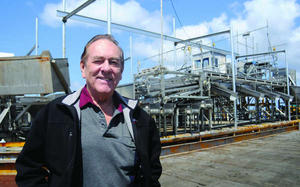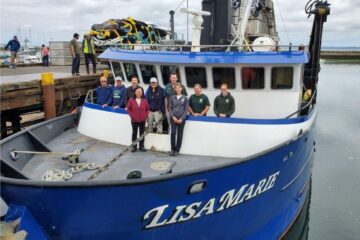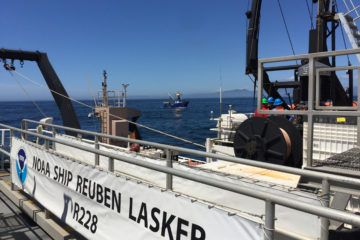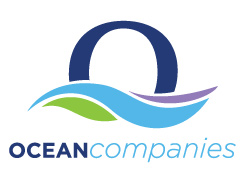QA Francis Miller
Sunday, April 24, 2011 – 00:06

JACOB JONES | THE DAILY WORLD Francis Miller, co-owner of the Ocean Companies including Ocean Gold Seafoods, Ocean Protein, Ocean Cold and Ocean Express, stands near processing machinery at the Ocean Gold plant at the Westport Marina.
Walking the docks he has worked since a child, Francis Miller stopped to chat with fishermen on a recent sunny day. They talked about the upcoming season, expected catches and a few of the challenges he knows all too well.
Miller, 79, now serves as co-owner of the Ocean Companies including Ocean Gold and Ocean Protein, but he has spent his whole life on the sea. From a cannery worker to a fleet owner to a seafood businessman, the Grayland native has always pulled his living from the water.
Fishing is in his blood and he has passed that passion to his children, who all continue to work in the fishing industry. He hopes to leave a legacy of responsible fishing and innovative processing on the Harbor.
What responsibilities do you have as a co-owner of the Ocean Companies?
I have a vested interest in the growth and sustainability of the Ocean Companies, including the independent business units of Ocean Gold Seafoods; Ocean Protein; Ocean Cold; and, Ocean Express. I am an active member of our board of directors and am involved in the strategic decisions our company makes.
How did you start fishing and how has the industry shaped your life?
I started working in the fishing business during World War II at the age of 11 in a Westport crab cannery. Shortly after graduating from high school in 1949, I purchased my first boat and began fishing out of Westport. By 1959 I was fishing both locally and in Alaska and had the opportunity to start expanding my fleet. In 1978 I started one of the first factory trawlers fishing in Alaska waters and worked at growing that business (Arctic Alaska Fisheries Corporation) until it went public in 1986 with more than 20 vessels.
By the early ’90s, we employed more than 2,200 when we sold to Tyson. While I took a small hiatus from the fishing business following that, I couldn’t stay away long and when the opportunity to get involved with the business again back in my home town emerged, I was excited to get back in the fishing game again.
What inspired the creation of Ocean Gold Seafoods?
Ocean Gold Seafoods began literally as a crab shack on the docks of Westport as Merino Seafoods. I came into the picture in the mid-’90s when the company looked to expand its operations to include processing Pacific whiting. We are now the largest shoreside processor for Pacific whiting on the West Coast, with the ability to execute any cut for any species with an hour’s notice. Our operational and infrastructure costs are monitored closely so that we can ensure that we pay our fishermen a competitive value for the product they deliver to us and we can provide our customers with quality product at reasonable prices.
What are the most significant issues currently facing the Grays Harbor fishing industry?
If there is one constant in the fishing business, it’s change. Currently, the industry is going through a significant shift in how we operate with the introduction of “catch shares” — a quota-based management system that assigns a percentage of the available groundfish catch to participants in the fishery based on their historic participation. It is an effort to curtail the “race for the fish” that many associate with our business. But like any new strategy, the devil is in the details and we are currently, as an industry, undergoing the challenging job of navigating these new guidelines while still maintaining a steady flow of fish through our facility.
How have “catch shares” or other regulations impacted local fishing?
One of the most significant challenges we face under the “catch share” system has to do with the limited amount of bycatch available for some species. Some fishermen have received such small amounts of this bycatch (the accidental catch that includes species that are currently in rebuilding plans) that it makes it very difficult to execute the fishery.
One result of those low bycatch numbers is the fact than many of our local fishermen active in the commercial ground fishery are waiting to fish for fear that they may catch too much bycatch before they are able to get their target fish out of the water. Coastwide, groundfish landings are down by about half and the impacts that has on jobs in our community are significant.
We are working to reinvent how we operate the fishery and are confident that in the coming years we will find a solution to this problem and be able to emerge even stronger than we were before the program was enacted at the start of this year.
What is the best part of your job?
No single day is the same. This isn’t a 9-to-5 job, it’s a way of life. I’ve been active in the fishing industry for nearly seven decades and it’s changed drastically over those years. I’ve had the opportunity to travel the world as a fisherman and I’ve been able to apply what I’ve learned in those experiences to the ever-changing nature of our business.
What challenges come with the job?
Ironically, sometimes the best part of the job is also the most frustrating. The changes are hard to sometimes keep up with, especially those that come from external entities such as regulatory agencies. There are days when a part of me wants to go back in time when this industry seemed more simple. But then I look at all the positive things we’ve done in recent history, particularly in relation to building more sustainable fishing stocks and more sophisticated fishing practices, and I’m proud to be a part of it.
What do you enjoy doing outside of work?
I enjoy spending time with my family and traveling. Of course, I still love to fish when I can, as well.
Anything most people don’t know about you, but should?
I delivered the first load of Pacific whiting to the Port of Grays Harbor back in 1966. My passion for fishing is also evidently genetic. All of my children remain active in the local fishing industry and are part owners in the Ocean Companies.
What goals lie ahead for Ocean Gold and its partner operations?
Right now our primary goal is to develop a strategy that will allow us to navigate the new catch share system, exploring new products and diversifying our operations. We are committed to building a healthy company that is committed to the health of our oceans and our communities. We expect to be here for a long time to come so that future generations can enjoy the adventure of fishing.
What sort of future plans do you have personally?
It’s difficult for me to pull apart my personal and professional goals. Much of my personal satisfaction comes from the business I’ve been fortunate to be a part of building and I take great personal satisfaction in leaving a healthy company behind when the time comes for me to move onto the next chapter of my life. Even though I’m celebrating my 80th birthday this year, I’m still just not quite ready to write that chapter yet.


